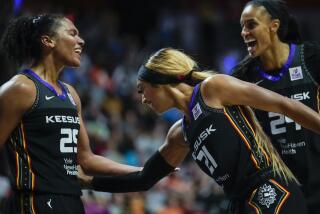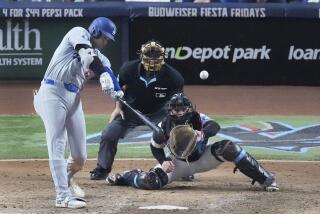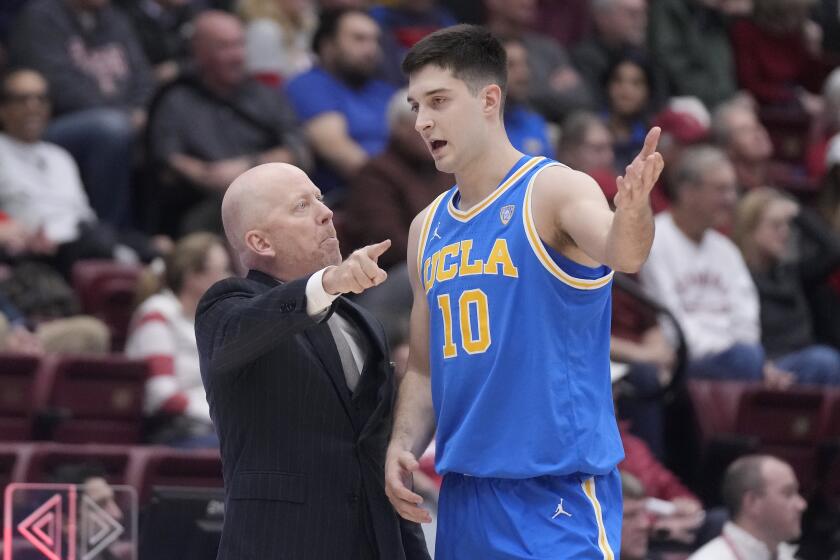Beamon’s Moment Soars Beyond Any of the Rest
Even with a year remaining in the century--and the millennium--all of the “greatest ofs” appear to have been exhausted, except for one.
What has been the greatest sports moment?
Bobby Thomson’s home run?
Doug Flutie’s Hail Mary pass?
Gene Sarazen’s double eagle at Augusta?
Don’t even bother to debate this one. It was Bob Beamon’s long jump of 29 feet 2 1/2 inches during the 1968 Summer Olympics in Mexico City, 21 3/4 inches beyond the previous world record.
It would be 12 years before anyone else would even jump 28 feet and 23 years before Mike Powell would break Beamon’s record.
According to David Wallechinsky’s “The Complete Book of the Olympics,” the jump was hailed as “the greatest athletic achievement of all time,” although critics tried to explain it by talking about suspicious wind readings and the high altitude.
Still, no one else on that day jumped farther than 26-10 1/2, and Beamonesque joined Ruthian as adjectives inspired by athletes to describe almost unimaginable performances.
*
There is a memorable scene in the Woody Allen film “Manhattan” about neo-Nazis marching in New Jersey.
“We should go down there, get some guys together, you know, get some bricks and baseball bats and really explain things to them,” the Allen character says.
“There was this devastating satirical piece on that on the Op-Ed page of the Times,” another character says. “It was devastating.”
“W-e-e-e-lll, a satirical piece in the Times is one thing,” Allen says, “but bricks and baseball bats get right to the point down there.”
Jesse Owens took the high road with the Nazis, running and jumping to four gold medals during the 1936 Summer Olympics in Berlin and making a mockery of Adolf Hitler’s theory of Aryan supremacy.
I don’t argue much with those who believe Michael Jordan or Babe Ruth is the greatest athlete of the 1900s, even less with those who choose Muhammad Ali or Pele, but my choice is Owens.
He set four records within 45 minutes on a May day in 1935 without, as former L.A. Timesman George Kiseda points out, “steroids, creatine, andro, weight training, prize money, bonuses for world records, artificial tracks and runways, and, yes, without starting blocks.”
Owens’ long jump record--26-8 1/4--lasted 25 years, two years longer than Beamon’s.
More significant, Owens carried the hopes and dreams of his race on his shoulders in Berlin and--while Hitler watched--triumphed.
Jackie Robinson did much the same thing a decade later, but although I would never underrate the value of his accomplishment, I rank Owens ahead because he performed on an international stage.
*
Ron Dayne hasn’t impressed NFL scouts as much as Edgerrin James and Ricky Williams did a year ago, although most still believe the Wisconsin tailback will be selected in the middle of the first round. . . .
Wisconsin Coach Barry Alvarez compares Dayne to Jerome Bettis. Alvarez is as close as there is to an expert on the subject because he was an assistant coach at Notre Dame when Bettis was recruited. . . .
Dayne has 20 pounds on Bettis but is not quite as fast and, more pertinent, doesn’t accelerate as quickly. . . .
Defenses that penetrate the offensive line and meet Dayne in the backfield, as Michigan did in its 21-16 victory over the Badgers this season, have at least an even chance of stopping him. . . .
But defenders who think of him merely as a straight-ahead, three-yards-and-a-pile back underestimate him. . . .
When he gets all of his body parts moving in the right direction, he is surprisingly nimble--as UCLA no doubt recalls from his 54-yard touchdown run in last January’s Rose Bowl game. . . .
The Cardinal will feel better about its chances Saturday against Dayne if its best run-stopping defensive lineman, Willie Howard, is able to play. . . .
Howard’s knee injury, suffered in the final regular-season victory over Notre Dame, could be even more crippling for the Cardinal than the dislocated wrist that is preventing All-American wide receiver Troy Walters from playing. . . .
Walters’ replacement is Tafti Uso, who took over for injured DeRonnie Pitts against USC and caught four passes for 71 yards. . . .
For Wisconsin, you hear mostly about Dayne. But the Badgers wouldn’t be here if freshman Brooks Bollinger hadn’t become the starting quarterback in the fifth game.
*
Wisconsin 38, Stanford 34. The Badgers will prevail even without the home-crowd advantage they enjoyed in their last two Rose Bowl appearances against UCLA.
Randy Harvey can be reached at his e-mail address: randy.harvey@latimes.com.
More to Read
Go beyond the scoreboard
Get the latest on L.A.'s teams in the daily Sports Report newsletter.
You may occasionally receive promotional content from the Los Angeles Times.










